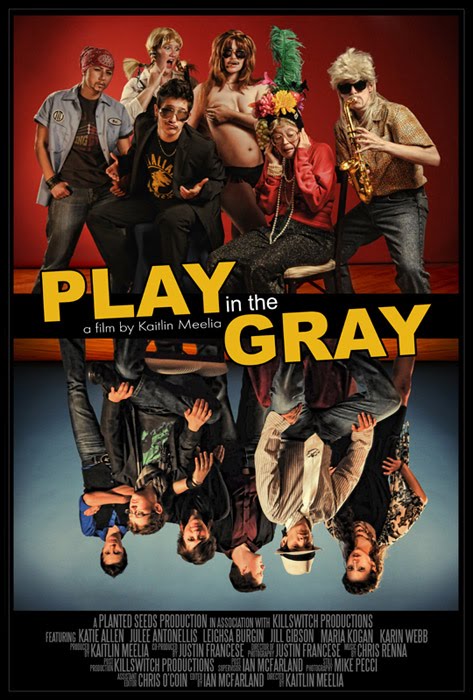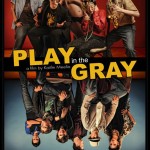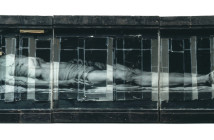A few weeks ago, I saw the newly-released documentary Play in the Gray at the Brattle Theatre as part of the Boston LGBT Film Festival. First-time filmmaker Kaitlin Meelia spent several years filming the members of the Boston-based drag and cabaret inspired theatre troupe All the Kings Men (ATKM), and beautifully combined many years worth of footage into a stunning documentary. Meelia first discovered ATKM performing at a bar in Jamaica Plain, where she was "blown away by their work and how they made such complicated gender issues so accessible and entertaining. I left that show wanting to know who these performers were. I wanted to hear their stories, learn their struggles and discover how their gender bending performance could reach a wider audience.”
I have been a fan of ATKM for many years, know many of the members personally, and have photographed them for my own work as well as on assignment. I walked into the theatre excited to see them on the big screen, but I wasn't expecting to be as moved as I was by the documentary. The film does an excellent job capturing their full story, both on stage and off. I was struck by the intense amount of emotion with which they live their lives, emotion which they intelligently and artfully pour into their work. Even as an artist whose work deals with gender and someone with my own personal struggles to live within a gray area, as the film's title implies about ATKM, I sometimes forget how challenging, moving, and ultimately rewarding it can be to wholeheartedly embrace who you are despite the lack of understanding within the world at large.
Questioning all kinds of boundaries is integral to ATKM's work. In the film, performer Jill Gibson struggles with this issue. “One of our greatest challenges is trying to figure out, what are we?” asks Jill:
“Are we a comedy troupe? Are we a dance troupe? Are we a drag troupe? And it’s funny that we struggle with that because in life we are kind of like, am I a boy? Am I a girl? Am I in-between? And we’re OK living in the gray.” Performer Maria Kogan seconds the struggle to identify the troupe. "We got our start in the drag community and we don’t want to ignore that or forget that, but we really want to step into and be seen in a new light. We’re sort of in a transition of how to describe ourselves. We’re definitely queer. We do drag, but it’s not that simple."
Art is a powerful tool for social change by exploring, challenging, and re-defining traditional ideas of gender and identity. According to performer Karin Webb:
"As an ensemble, we have a lot of fun poking at the status quo and illustrating our lives and stories in a parallel way. Because we are all people who live in between the lines (against the grain of definitions), it is second nature to try on the mask of what other 'characters' might experience or discover when put in the context of our world and thoughts. It is fun, it is inspiring, and it helps us work out and say our own thoughts about this crazy, crazy world."
In addition to creating a portrait of the troupe as they tour, perform, give workshops, and present themselves to the world publicly, the film also follows several of the members home and shows the relationships, and sometimes struggles, they have with their families. I found this to be one of the most moving parts of the film, as it is a part of the troupe that the audience is usually not allowed to see. ATKM is such an intelligent and polished troupe that it is easy to forget how much it takes for them to do what they do, both practically and emotionally. Meelia didn't begin the project expecting to focus on the personal lives of ATKM as much as she did. Meelia said:
"The film changed a lot throughout the process of making it. It became much more of a personal story than I had originally imagined it would be, by which I was very pleased. I feel so grateful that the troupe members opened up their lives to us as much as they did. Going home with the troupe members really made this film more than a 'behind the scenes' type of film. I think it was difficult for some troupe members because it was the first time that they had so openly talked with their families about some of the issues we brought to the table. I feel very grateful that they were open to having a camera there for those moments."
From the performer’s point of view, Webb said it was a "little harder" to show her personal struggles so publicly, but acknowledged "the art that I put on the stage has just as much consideration and personal content and risk as sharing stories without the costumes."
As a troupe, ATKM offers so many different talents and types of performance that it's impossible to describe what they do in a simple tagline, word, or phrase (and not so coincidentally, the same can be said about the ambiguity and fluidity of gender expressions present in their work and their lives). They are incredible performers who make you laugh, cry, and think. After hearing more about their personal stories and their absolute commitment to making their mark on the world through their performance, I walked out of the theatre with tears in my eyes.
ATKM is growing faster than ever, and the performers are all dedicated to continuing to produce top quality, thought-provoking, gender-bending performance. I think it's safe to say that Webb speaks for the troupe when she talks about her hope for ATKM and Play in the Gray. Webb went on to say:
"I hope this film reaches all over the world and that it finds success in distributing to as many people as possible! I hope ATKM continues to create new material and that we continue to tour more and more. I also think this film will be great for youth who are coming to know themselves. I hope that people become more and more comfortable living as themselves rather than trying to fit in any box."
And Meelia's hopes for the film? "Our great hope is that Play in the Gray challenges the audience to recognize the gender binary as an arbitrary and unnecessary limitation to human potential."
- Official promotion for Play the Gray, by Kaitlin Meelia – featuring members of ATKM.
- Members of ATKM improvising for the camera (photo: Lisa Colandrea).
Play in the Gray - Official Site
All the Kings Men (ATKM)
"Play the Gray" was on screened on May 8th at the Brattle Theater, located at 40 Brattle St., Cambridge, MA.
All images are courtesy of the ATKM.






